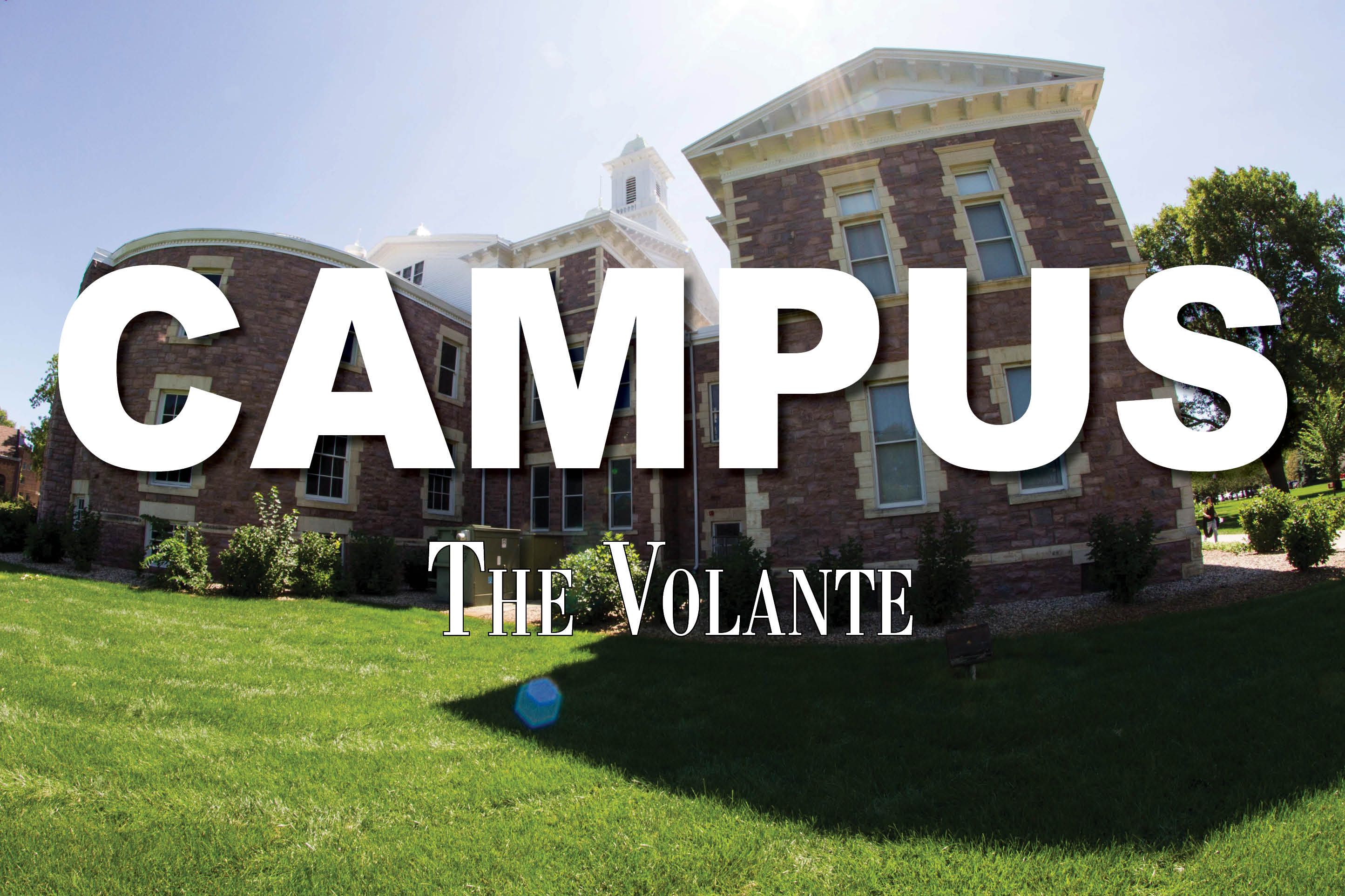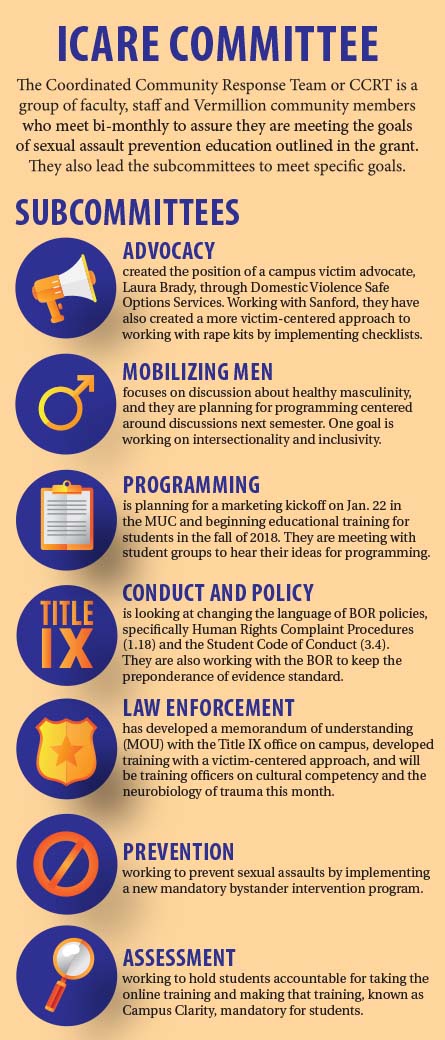
ICARE explained: Strategic plan approved, subcommittees move forward
The ICARE strategic plan, a $300,000 sexual assault prevention and education grant the university received in 2016, was approved on Oct. 20.
ICARE stands for Inclusive, Compassion, Accountability, Respect and Engagement. It’s “committed to preventing and responding to sexual assault in the University of South Dakota community through programming and advocacy,” according to the mission statement.
ICARE program coordinator Marisa Cummings was hired Feb. 14, 2017. Since the grant’s approval, Cummings has been working with the Coordinated Community Response Team (CCRT) and subcommittees to prepare for ICARE’s implementation.
“We went through a very purposeful and thought-out strategic planning process,” Cummings said. “We made sure that the people in the CCRT are individuals with key positions in the university that can institute change. Everyone that sat at that table has the power to institute change and cause systemic change that is long-term.”
Subcommittees for the grant include law enforcement, advocacy, conduct and policy, prevention, mobilizing men, programming and assessment.

Law enforcement
Vermillion Police Department Lieutenant Crystal Brady is one member of the law enforcement subcommittee.
The strategic plan details many of the duties of the law enforcement subcommittee, including a memorandum of understanding (MOU) with the Title IX office on campus.
Crystal Brady said VPD has a duty to prosecute cases, while the Title IX office investigates cases on campus.
“We try to make sure that we’re not stepping on their toes and they’re not stepping on our toes when we’re trying to accomplish the same thing,” Crystal Brady said. “It’s just a better way for us to work together to get a better result.”
With ICARE’s victim-centered approach, one goal of law enforcement is to develop training for officers on cultural competency and the neurobiology of trauma.
Crystal Brady said the required trauma training will take place this month and will give officers a better understanding of where victims are coming from.
“I think that it’s additional information that the officers will have just to give a better understanding on where victims are coming from, what they’ve been through, why they maybe react the way they do to certain things or why they don’t make a report right away,” Crystal Brady said.
Advocacy
Laura Brady, a rural advocate for Domestic Violence Safe Options Services, was recently hired as USD’s first campus victim advocate. Her responsibilities include remaining on-call through DVSOS for any student who needs advocacy service.
Part of her salary is paid through the grant, Cummings said.
An advocate provides confidential services to victims to support them in their healing or reporting process, Laura Brady said.
“We are not counselors, but we support in their healing process and then we also assist them and support them through any legal proceedings that they approve,” she said. “All of our services are completely confidential and free.”
Cummings said an advocate is someone who’s there for victims every step of the way. It’s up to the victim whether or not they opt for an advocate to be involved in the process, she added.
“These processes are confusing, especially when someone is going through trauma, so that’s what the advocate does,” Cummings said. “They’re there for the emotional well-being of the victim.”
Other parts of the advocacy subcommittee include the Student Counseling Center and Student Health at Sanford. Cummings said the subcommittee has worked with Sanford to create a more victim-centered approach to working with rape kits. A checklist has been implemented for nurses who aren’t trained as SANE nurses (sexual assault nurse examiners).
“Rape kits are complicated,” Cummings said. “If you’re not a SANE trained nurse, they may not have done a rape kit, so making sure there’s a checklist so they know what to do. This is an issue everywhere in the country with rape kits, and I think that’s an area we’ve identified that can be really emotionally traumatic for the victim to have to go through.”
Conduct and policy
Kim Grieve, vice president of student affairs and dean of studentsand Khara Iverson, director of equal opportunity & Title IX coordinator are both involved in the conduct and policy subcommittee. Their focus is on changing South Dakota Board of Regents policies, specifically Human Rights Complaint Procedures (1.18) and the Student Code of Conduct (3.4).
“There are a lot of changes to the wording of the student conduct policy. However, based on the new Title IX guidelines from Betsy DeVos, our policies are changing in such a way that it does take that time limit out,” Iverson said. “Truly we have been operationalized so that both parties, both respondent and complainant, have due process and are afforded the same rights and options.”
Grieve, who’s part of the BOR as vice president of student affairs, said the BOR is looking at changes to the wording of those policies but won’t move to DeVos’ proposed standard of “clear and convincing evidence.”
According to the New York Times, “preponderance of evidence” means colleges must find a student responsible if it’s likely that the student committed a sexual assault. A “clear and convincing” case means it’s highly probable a sexual assault occurred. The new language has met criticism from victim advocates.
“Really what we are changing is language and minor things because we were being fair to both the alleged victim and the alleged perpetrator,” Grieve said. “We’re going to keep with the preponderance of evidence, we’re not going to ‘clear and convincing,’ which I’m really pleased about.”
Iverson said she sees ICARE as a step in the right direction, and is looking forward to implementing the prevention education.
“I’m very happy that the strategic plan has been approved, and now we can actually go into the implementation phase,” Iverson said. “Before, it was very frustrating not to be able to do anything with it, but now we can start to implement it and hopefully see some progress in prevention education programming.”
Prevention
Michele Turner, prevention coordinator and counselor; Bridget Diamond-Welch, grant program director and assistant professor of criminal justice; Debra Robertson, director of student counseling center; and Cummings are the members of the prevention subcommittee.
Cummings said there’s an “incredible amount of work to be done” in this committee. One goal is to implement a bystander intervention program for all incoming students that is also accessible to returning students and faculty, she said.
“I think that’s because it centers around the bystander intervention program, and that will require a lot of training,” she said.
Assessment
In addition to the bystander intervention program is Campus Clarity, the online training students receive via email in the beginning of the school year.
One strategic plan goal is to implement an evidence-based, research-informed sexual assault prevention program that will be mandatory for all incoming students.
“Our goal really is to work on how we can improve the numbers of the online training as well as face-to-face training,” Grieve said. “We’re talking about sending the invitation for students to take the training during the summer, so prematriculation, in hopes to get our numbers higher.”
Cummings said the assessment committee is working on ways to hold students accountable for taking the online training.
“We’re trying to figure out how we can develop internal flags right now,” she said. “It has to be mandatory and it has to be done prematriculation so if all the freshmen get it done before they get here, they get on campus already having some form of outreach, some frame of reference.”
Cummings said having multiple trainings will create a holistic approach to prevention.
“Then when (students) get here, if we again have that message about consent and sexual assault prevention and then they’re also hearing that message in the residence halls, that’s what creates a holistic approach,” she said.
Programming
ICARE will be introduced to students and the community with a programming kickoff Jan. 22 in the Muenster University Center. The new educational training will begin next fall.
A web page will also be made available to students and the USD community as a resource for Title IX and a guideline of options for victims.
Cummings said there are a lot of goals for programming, including implementing information on consent through marketing materials.
She said this group also wants to implement programming in residence halls.
“That’s a way we can make sure we are intersectional and we’re hitting all of those areas as well as different student organizations,” she said.
Cummings is working on meeting with student group leaders to hear their needs with programming.
“It’s just more trying to engage everyone in the process but it will be a work in progress,” Cummings said. “I think once we do the launch, it may be a lot easier to recruit students in the process.”
One student group she’s partnered with for programming is PAVE (promoting awareness and victim empowerment). She said they’ll be a good group to implement the bystander intervention program’s “train the trainer” component.
“We are very lucky to have PAVE because you have students that are genuinely engaged in this type of work right now,” she said.
Mobilizing men
Healthy masculinity is a focus of the mobilizing men subcommittee led by CCRT member Lamont Sellers, associate vice president for diversity.
“Making sure that we’re inclusive of marginalized students and men is something we’ve been very conscious about from the beginning,” Cummings said.
Cummings said there’s a need to reframe the ideas of what it means to be a man.
“What does it mean to be a man? It means that you’re strong, don’t cry, provide for your family, don’t feel emotion and a lot of those ideas can make men have emotional and psychological responses that aren’t good,” Cummings said.
Cummings said men are socialized to view women as sexual objects, and that college can facilitate that view.
“Also the idea that men are conquest-oriented when they come to college, like they come to college and see how many people they can sleep with. That’s a mentality that would be considered unhealthy masculinity,” Cummings said. “Those types of thoughts are what we’re trying to break down and build up healthy ideas of what it means to be a man.”
Programming for mobilizing men will start next semester, Cummings said.
“They’re going to start having these programs where men lead the discussion about healthy masculinity and being a man,” she said. “Those are conversations men often don’t have, and it has to be facilitated very well and strategically.”
Cummings said ICARE is meant to be intersectional.
“We have to continue to bring people to the table, we have to continue to build allies, we have to continue to look at how we can do things better all the time,” she said.
One concern about ICARE is that it only lasts three years. USD can apply for the grant again, but there’s a chance the university might not receive the grant again in three years.
Cummings said ICARE is sustainable through student involvement and the CCRT.
“My hope is that there’s enough key players at the CCRT to advocate at that high level. This is a priority,” she said. “That requires students to be a part of that process.”
Considering the turnout of the town hall, Cummings said she wants to make sure sexual assault prevention education is a priority on campus.
“It’s so important to have that relationship with students because right now, we’re seeing students say this is an issue on campus,” she said. “Without students having that voice, there’s so much that goes on with administrators, it can sometimes get lost. So students have to make sure also to be active participants and engaging in the process.”


